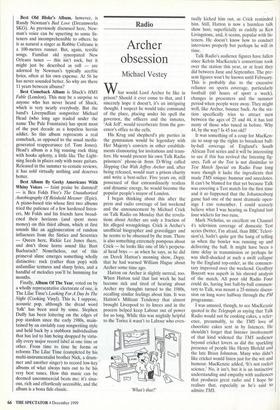Radio
Archer obsession
Michael Vestey
What would Lord Archer be like in prison? Should it ever come to that, and I sincerely hope it doesn't, it's an intriguing thought. I suspect he would take command of the place, placing under his spell the governor, the officers and the inmates, 'Ask Jeff, would reverberate from the gov- ernor's office to the cells.
His Krug and shepherd's pie parties in the gymnasium would be legendary with Her Majesty's convicts in other establish- ments clamouring for invitations and trans- fers. He would present his own Talk Radio prisoners' phone-in from D-Wing called Slopping Out With Jeffrey Archer and, after being released, would start a prison charity and write a best-seller. Five years on, still possessed of that extraordinarily restless and dynamic energy, he would become the popular people's mayor of London.
I began thinking about this after the press and radio coverage of last weekend and the announcement by Michael Crick on Talk Radio on Monday that the revela- tions about Archer are only a fraction of his alleged wrongdoings. Crick is Archer's unofficial biographer and gravedigger and he seems to be obsessed by the man. There is also something extremely pompous about Crick — he looks like one of life's perpetu- al head boys — as when he says, as he did on Derek Hatton's morning show, Degsy, that he had warned William Hague about Archer some time ago.
Hatton on Archer is slightly surreal, too. When Hatton said that last week he had become sick and tired of hearing about Archer my thoughts turned to the 1980s, recalling similar feelings about him. It was Hatton's Militant Tendency that almost brought Liverpool to its knees and in the process helped keep Labour out of power for so long. While this was mightily helpful to the Tories it wasn't to Labour who even- 'What's that?' tually kicked him out, as Crick reminded him. Still, Hatton is now a harmless talk show host, superficially as cuddly as Ken Livingstone, and, it seems, popular with lis- teners. He doesn't know how to conduct interviews properly but perhaps he will in time.
Talk Radio's audience figures have fallen since Kelvin MacKenzie's consortium took over the station this year, or at least they did between June and September. The pre- sent figures won't be known until February. This is probably due to the excessive reliance on sports coverage, particularly football (60 hours of sport a week), changes in presenters and the summer period when people were away. They might well, like Archer, bounce back. As the sta- tion specifically tries to attract men between the ages of 25 and 44, it has lost many of those who tuned in before. Why 44, by the way? Is 45 too old?
It was something of a coup for MacKen- zie to snap up the rights to broadcast ball- by-ball coverage of England's South African Test series and it will be interesting to see if this has revived the listening fig- ures. Talk at the Test is not dissimilar to Test Match Special on Radio Four long wave though it lacks the ingredients that made TMS unique: humour and anecdotes. It can't be blamed for that yet because Talk was covering a Test match for the first time and it so happened that the Johannesburg game had one of the most dramatic open- ings I can remember. I could scarcely believe what I was hearing as England lost four wickets for two runs.
Mark Nicholas, so excellent on Channel 4's television coverage of domestic Test series (better, I'm afraid, than BBC Televi- sion's), hadn't quite got the hang of telling us when the bowler was running up and delivering the ball. It might have been a time delay in transmission or perhaps he was shell-shocked at such a swift collapse by the England top-order, as the commen- tary improved over the weekend. Geoffrey Boycott was superb in his shrewd analysis of the match. All poor old Radio Four could do, having lost ball-by-ball commen- tary to Talk, was mount a 25-minute discus- sion on long wave halfway through the PM programme.
I was amused, though, to see MacKenzie quoted in the Telegraph as saying that Talk Radio would not be cooking cakes, a refer- ence, presumably, to the TMS love of chocolate cakes sent in by listeners. He shouldn't forget that listener involvement of that kind widened the TMS audience beyond cricket lovers as did the sparkling presence of people like Henry Blofeld and the late Brian Johnston. Many who didn't like cricket would listen just for the wit and humour. MacKenzie added, 'It's not rocket science.' No, it isn't, but it is an instinctive understanding and empathy with audiences that produces great radio and I hope he realises that, especially as he's said to admire TMS.


















































































 Previous page
Previous page